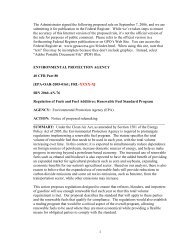Nanotechnology in Food & Agriculture - denix
Nanotechnology in Food & Agriculture - denix
Nanotechnology in Food & Agriculture - denix
You also want an ePaper? Increase the reach of your titles
YUMPU automatically turns print PDFs into web optimized ePapers that Google loves.
32<br />
Time to choose susta<strong>in</strong>able food and farm<strong>in</strong>g<br />
Produc<strong>in</strong>g enough safe, healthy<br />
food to meet the needs of all global<br />
citizens, and do<strong>in</strong>g so <strong>in</strong> an ecologically<br />
susta<strong>in</strong>able and socially just manner,<br />
will be a grow<strong>in</strong>g challenge <strong>in</strong> the<br />
decades ahead. Proponents of<br />
nanotechnology predict that it will<br />
deliver more environmentally benign<br />
agricultural systems which are also vastly<br />
more productive - the solution both to<br />
environmental degradation associated<br />
with conventional agriculture, as well<br />
as to widespread hunger. However<br />
Friends of the Earth is concerned that<br />
while nanotechnology may deliver<br />
efficiencies <strong>in</strong> some areas, on balance<br />
it may <strong>in</strong>troduce more health and<br />
environmental problems than it solves,<br />
while do<strong>in</strong>g noth<strong>in</strong>g to redress the root<br />
causes of exist<strong>in</strong>g <strong>in</strong>equities <strong>in</strong> global<br />
food distribution.<br />
<strong>Nanotechnology</strong> is unlikely to deliver<br />
environmentally susta<strong>in</strong>able food<br />
systems<br />
<strong>Nanotechnology</strong> <strong>in</strong> agriculture stands<br />
<strong>in</strong> contrast to grow<strong>in</strong>g public support<br />
| NANOTECHNOLOGY IN FOOD & AGRICULTURE<br />
for more environmentally susta<strong>in</strong>able<br />
food production. Aga<strong>in</strong>st the back<br />
drop of climate change, there is a<br />
mount<strong>in</strong>g recognition that meet<strong>in</strong>g a<br />
greater proportion of our food needs<br />
on a regional basis, reduc<strong>in</strong>g the<br />
greenhouse gas emissions associated<br />
with food production and transport, and<br />
us<strong>in</strong>g less fossil-fuel <strong>in</strong>tensive agricultural<br />
<strong>in</strong>puts makes environmental sense. Yet,<br />
nanotechnology appears likely to result<br />
<strong>in</strong> new pressures to globalise each sector<br />
of the agriculture and food system and<br />
to transport agricultural chemicals, seeds<br />
and farm <strong>in</strong>puts, unprocessed agricultural<br />
commodities and processed foods over<br />
even further distances at each stage <strong>in</strong><br />
the production cha<strong>in</strong>.<br />
Nano agrochemicals designed for<br />
controlled self-release <strong>in</strong> response to<br />
chang<strong>in</strong>g environmental conditions and<br />
nano-sensor based farm management<br />
systems, aim to enable larger scales of<br />
production of more uniform crops. In<br />
this way, nanotechnology entrenches<br />
and expands the <strong>in</strong>dustrial scale model<br />
of monoculture agriculture which has<br />
resulted <strong>in</strong> rapid losses of agricultural and
















